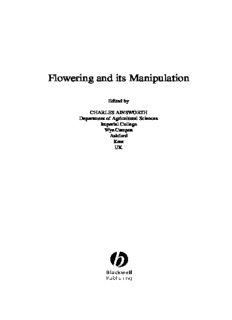
Flowering and its manipulation PDF
Preview Flowering and its manipulation
Flowering and its Manipulation Editedby CHARLESAINSWORTH DepartmentofAgriculturalSciences ImperialCollege WyeCampus Ashford Kent UK Flowering and its Manipulation Annual Plant Reviews Aseriesforresearchersandpostgraduatesintheplantsciences.Eachvolumeinthisseries focusesonathemeoftopicalimportanceandemphasisisplacedonrapidpublication. EditorialBoard: Professor Jeremy A. Roberts (Editor-in-Chief), Plant Science Division, School of Biosciences, University of Nottingham, Sutton Bonington Campus, Loughborough, Leicestershire,LE125RD,UK;DrDavidEvans,SchoolofBiologicalandMolecularSci- ences, Oxford Brookes University, Headington, Oxford, OX3 0BP; Professor Hidemasa Imaseki,Obata-Minami2419,Moriyama-ku,Nagoya463,Japan;DrMichaelT.McManus, InstituteofMolecularBioSciences,MasseyUniversity,PalmerstonNorth,NewZealand;Dr Jocelyn K.C. Rose, Department of Plant Biology, Cornell University, Ithaca, New York 14853,USA. Titlesintheseries: 1. Arabidopsis EditedbyM.AndersonandJ.A.Roberts 2. BiochemistryofPlantSecondaryMetabolism EditedbyM.Wink 3. FunctionsofPlantSecondaryMetabolitesandtheirExploitationinBiotechnology EditedbyM.Wink 4. MolecularPlantPathology EditedbyM.DickinsonandJ.Beynon 5. VacuolarCompartments EditedbyD.G.RobinsonandJ.C.Rogers 6. PlantReproduction EditedbyS.D.O’NeillandJ.A.Roberts 7. Protein–ProteinInteractionsinPlantBiology EditedbyM.T.McManus, W.A.LaingandA.C.Allan 8. ThePlantCellWall EditedbyJ.K.C.Rose 9. TheGolgiApparatusandthePlantSecretoryPathway EditedbyD.G.Robinson 10. ThePlantCytoskeletoninCellDifferentiationandDevelopment Editedby P.J.Hussey 11. Plant–PathogenInteractions EditedbyN.J.Talbot 12. PolarityinPlants EditedbyK.Lindsey 13. Plastids EditedbyS.G.Moller 14. PlantPigmentsandtheirManipulation EditedbyK.M.Davies 15. MembraneTransportinPlants EditedbyM.R.Blatt 16. IntercellularCommunicationinPlants EditedbyA.J.Fleming 17. PlantArchitectureanditsManipulation EditedbyC.Turnbull 18. Plasmodesmata EditedbyK.J.Oparka 19. PlantEpigenetics EditedbyP.Meyer 20. FloweringanditsManipulation EditedbyC.Ainsworth 21. EndogenousPlantRhythms EditedbyA.HallandH.McWatters 22. ControlofPrimaryMetabolisminPlants EditedbyW.C.PlaxtonandM.T.McManus 23. BiologyofthePlantCuticle EditedbyM.Riederer Flowering and its Manipulation Editedby CHARLESAINSWORTH DepartmentofAgriculturalSciences ImperialCollege WyeCampus Ashford Kent UK ©2006byBlackwellPublishingLtd EditorialOffices: BlackwellPublishingLtd,9600GarsingtonRoad,OxfordOX42DQ,UK Tel:+44(0)1865776868 BlackwellPublishingProfessional,2121StateAvenue,Ames,Iowa50014-8300,USA Tel:+15152920140 BlackwellPublishingAsia,550SwanstonStreet,Carlton,Victoria3053,Australia Tel:+61(0)383591011 TherightoftheAuthortobeidentifiedastheAuthorofthisWorkhasbeenassertedinaccordancewith theCopyright,DesignsandPatentsAct1988. Allrightsreserved.Nopartofthispublicationmaybereproduced,storedinaretrievalsystem,or transmitted,inanyformorbyanymeans,electronic,mechanical,photocopying,recordingor otherwise,exceptaspermittedbytheUKCopyright,DesignsandPatentsAct1988,withouttheprior permissionofthepublisher. Firstpublished2006byBlackwellPublishingLtd ISBN-10:1-4051-2808-9 ISBN-13:978-14051-2808-7 LibraryofCongressCataloging-in-PublicationData Floweringanditsmanipulation/editedbyCharlesAnisworth. p.cm. Includesbibliographicalreferences. ISBN-13:978-1-4051-2808-7(hardback:alk.paper) ISBN-10:1-4051-2808-9(hardback:alk.paper) 1.Plants,Floweringof. I.Ainsworth,C.C.(CharlesColin),1954- SB126.8.F582006 (cid:2) 635.915233–dc22 2005022778 AcataloguerecordforthistitleisavailablefromtheBritishLibrary Setin10/12ptTimes byNewgenImagingSystems(P)Ltd.Chennai,India PrintedandboundinIndia byReplikaPressPvt,Ltd,Kundli Thepublisher’spolicyistousepermanentpaperfrommillsthatoperateasustainableforestrypolicy, andwhichhasbeenmanufacturedfrompulpprocessedusingacid-freeandelementarychlorine-free practices.Furthermore,thepublisherensuresthatthetextpaperandcoverboardusedhavemet acceptableenvironmentalaccreditationstandards. ForfurtherinformationonBlackwellPublishing,visitourwebsite: www.blackwellpublishing.com Contents Contributors xiii Preface xv PartI. CoreDevelopmentandGenetics 1 Adevelopmentalgeneticmodelfortheoriginoftheflower 3 DAVIDA.BAUMandLENAC.HILEMAN 1.1 Introduction 3 1.2 Whatisaflower? 4 1.3 Phylogeneticandpaleontologicalcontext 5 1.4 Evolutionarynoveltiesoftheflower 6 1.4.1 Bisexuality 6 1.4.2 Determinate/compressedaxes 7 1.4.3 Perianth 7 1.5 Orderingthekeystepsinfloralevolution 8 1.6 Developmentalgeneticbackground 9 1.6.1 Positionandidentityofthereproductiveorgans 9 1.6.2 Developmentalregulationoftheperianth 13 1.7 Modelsfortheoriginofbisexuality 14 1.8 Apicalmegasporophyllproductiononamicrosporangiateaxis? 16 1.9 Thecompressionofthefloralaxis 18 1.10 Theevolutionoftheperianth 19 1.11 Theoriginofadimorphicperianth 20 1.12 Conclusion 21 References 22 2 Floralinduction 28 REYNALDTREMBLAYandJOSEPHCOLASANTI 2.1 Introduction 28 2.2 Floraltransitionismarkedbydevelopmentalphasechanges 28 2.3 Floralinductionismediatedthroughmultiplepathways 30 2.4 Photoperiodicfloralinductionprovidesacuetoseasonalchanges 31 2.4.1 Photoreceptorstransducelightsignals 31 2.4.2 Thecircadianclockisself-reinforcing 32 2.4.3 Keygenesintegratephotoperiodicinduction 32 vi CONTENTS 2.4.4 COandFTgenefunctionisconservedinotherplant species 34 2.4.5 PhotoperiodinductionthroughCO-independent pathways 35 2.5 Autonomouspathway 36 2.5.1 FLOWERINGLOCUSCintegratesdifferentfloral inductivepathways 36 2.6 Vernalization 38 2.6.1 MediationofvernalizationinArabidopsisbyFLC repression 38 2.6.2 Vernalizationincereals 40 2.7 Hormonesandotherfactors 41 2.7.1 Nutrientdiversiontheoryoffloralinduction 41 2.7.2 Gibberellin 42 2.7.3 Long-distancefloralinductivesignals 44 2.7.4 Integrationandcommencementofthefloraltransition 45 2.7.4.1 LEAFYandAPETALA1 45 2.7.4.2 TERMINALFLOWER1 45 2.7.4.3 ConservationofLFYfunctioninhigherplants 45 2.8 Perspective 46 References 46 3 Floralpatterningandcontroloffloralorganformation 49 ELENAM.KRAMER 3.1 Introduction 49 3.2 TheABCmodeloffloralorganidentity 49 3.2.1 ThemajorgeneticplayersintheABCmodel 50 3.2.2 MembersoftheMADS-boxtranscriptionfactorfamily 51 3.2.2.1 Redundantandcomplexfunctionsamong thefloralMIKCMADS-boxgenes 53 3.2.3 MembersoftheAP2/EREBPtranscriptionfactorfamily 55 3.3 Regulatingtheexpressionofthefloralorganidentitygenes 56 3.4 ConservationandmodificationoftheABCprogram 58 3.4.1 FloralorganidentitygenefunctioninPetunia 58 3.4.2 FloralorganidentitygenefunctioninOryza 60 3.5 Sexdeterminationasamodificationoffloralorganidentity 62 3.6 Futureperspectives 63 References 64 4 Thegeneticcontrolofflowersizeandshape 71 LYNETTEFULTON,MARTINEBATOUX,RAMKISHORYADAV andKAYSCHNEITZ 4.1 Introduction 71 4.2 Flowerprimordiumoutgrowth 73 CONTENTS vii 4.3 Regulatingflowermeristemsize 74 4.3.1 Cell–cellcommunication,patternformationinthe meristemandmeristemsize 75 4.3.2 Cellularfactorsregulatingfloralmeristemdevelopment 77 4.4 Earlycontroloforganogenesisintheflower 79 4.5 Generatingorganboundaries 82 4.6 Floralorgansize 84 4.7 Flowershapeandsymmetry 86 4.7.1 Floraldeterminacy 86 4.8 Dorsoventralsymmetry 88 4.8.1 Petalasymmetryandcontortaestivation 90 4.9 Outlook:toboldlygowherenoonehasgonebefore... 91 References 92 5 Inflorescencearchitecture–Movingbeyonddescription todevelopment,genesandevolution 98 SUSANR.SINGER 5.1 Overview 98 5.2 Inflorescencetypologies 98 5.3 Inflorescencedevelopment 104 5.3.1 Inflorescencemeristem 104 5.3.2 Regulatingdeterminacy 105 5.3.3 Regulatingmeristemidentity 108 5.4 Evolutionofinflorescencearchitecture 108 5.4.1 Teosinte 108 5.4.2 CauliflowerandBroccoli 109 5.4.3 Phenotypicplasticity 110 5.5 Futuredirections:modelinginflorescencearchitecture 111 References 111 PartII. SpecialisedComponentsofDevelopment 6 Close,yetseparate:patternsofmaleandfemalefloral developmentinmonoeciousspecies 117 RAFAELPERL-TREVESandPREMANANDRAJAGOPALAN 6.1 Introduction 117 6.2 Ecologicalandevolutionaryaspectsof monoeciousplantdevelopment 118 6.2.1 Evolutionofdiversereproductivestrategiesinland plants 118 6.2.2 Selectiveforcesthatfavortheevolutionofunisexual flowers 119 6.2.3 Flexibilityinsexratiosinmonoeciousplants 119 6.2.4 Relationshipbetweenmonoecyandpollination 121 viii CONTENTS 6.2.5 Theandromonoeciousoption:morecompromises? 121 6.3 Howdounisexualflowersdevelop? 122 6.3.1 Structuraldifferencesbetweenmaleandfemaleflowers 122 6.3.2 Unisexualflowerdevelopmentinmaize 123 6.3.2.1 Developmentofthemaleandfemaleflorets 123 6.3.2.2 Mutationsthataffectstamendevelopment: roleofgibberellin 124 6.3.2.3 Mutationsthataffectpistilabortion 126 6.3.2.4 Cytokinincounteractspistilabortion 127 6.3.2.5 Conservationofthemaizesex determinationpathwayinotherspecies 128 6.3.3 Unisexualflowerdevelopmentincucumber 129 6.3.3.1 Cucumberasanexperimentalmodelforsex expression 129 6.3.3.2 Sexexpressioninthecucumberbudand alongtheshoot 129 6.3.3.3 Inheritanceofsexincucumber 130 6.3.3.4 Environmentalandhormonalregulationof sexexpression 131 6.3.3.5 Amodelforcucumbersexexpression 132 6.3.3.6 Molecularstudiesonethylene-synthesisand perceptiongenesinCucumis 134 6.3.3.7 Searchfor‘effectorgenes’thatcarryoutthe developmentalprogramfollowingsex determination 138 6.4 Concludingremarks 141 References 142 7 Cytoplasmicmalesterility 147 FRANÇOISEBUDAR,PASCALTOUZETandGEORGES PELLETIER 7.1 Introduction 147 7.2 Pioneeringworkinplantsexualityandhybridisation 147 7.3 EarlystudiesofCMS 148 7.4 DefinitionofCMSasasystemwithtwogeneticdeterminants 149 7.5 UseofCMSinhybridseedproduction 150 7.6 ThesearchforCMS:intraspecificcrosses,alloplasmic situationsandcybrids 153 7.7 SpontaneousCMSsresultfromgenomicconflictbetween nuclearandcytoplasmicgenes 156 7.8 MolecularstudiesonCMSs:asteptowards understandingorconfusion? 159 7.8.1 TheTexasstory 159 7.8.2 IdentificationofCMSgenes 161
Description: